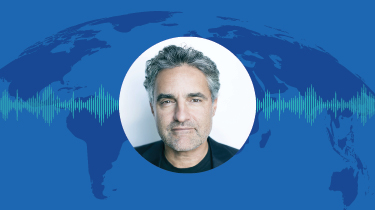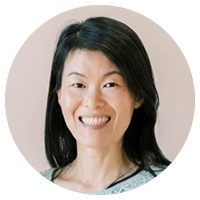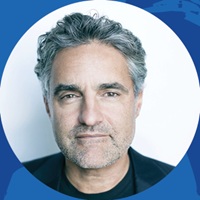Season 2 - EP 05
Navigating export hurdles to achieve global success
May 28, 2025

Navigating export hurdles to achieve global success
Discover how Eleanor Lee and Angel Kho transformed a simple teething challenge into LouLou Lollipop, a globally recognized lifestyle brand. Learn from their inspiring story of navigating international markets, achieving sustainability goals and building a loyal customer base with thoughtful design.
Key topics discussed:
- Turning a local idea into a global business
- Strategies for scaling sustainably
- Tips for navigating export challenges (compliances, potential tariffs, trademarks)
- Building a brand with effective social media
Where to listen
Never miss an episode that could transform your business. Follow us on your favourite streaming platforms for new episodes every month.
Bruce Croxon (00:04): Hi, and welcome back to the Export Impact Podcast, brought to you by Export Development Canada (EDC). My name is Bruce Croxon and I’m the host of the Export Impact Podcast. Today, I have the pleasure of speaking with two inspiring entrepreneurs who have turned a personal need into a globally recognized brand.
Eleanor Lee and Angel Kho are the co-founders of LouLou Lollipop, a woman-owned B Corp-certified Canadian lifestyle brand, offering modern, thoughtfully designed children’s essentials.
From their kitchen table to international markets, their journey is a testament to the power of innovation, resilience and purpose-driven business. We’ll hear how they navigated the challenges of exporting, built a loyal customer base and maintain their commitment to quality and sustainability.
I’d like to begin today’s episode by acknowledging that we’re recording from my office in Toronto, which is on the traditional unceded territory of Many Nations, including the Missassaugas of the Credit, the Anishnabeg, the Chippewa, the Haudenosaunee, and the Wendat Peoples, and is now home to many diverse First Nations, Inuit and Metis. We value taking this moment to deepen the appreciation of our Indigenous communities—wherever we are—and remind ourselves of our shared debt to Canada’s First Peoples.
Welcome to the show, Eleanor and Angel. We’re pleased to have you join us today.
Eleanor (01:36): Thank you, Bruce. Thank you for having us.
Angel: Thank you, Bruce. It’s our pleasure to be on.
Bruce Croxon (01:41): You’re most welcome. Let’s start at the beginning if that’s OK. Eleanor, let’s start with you. Where did the idea for LouLou Lollipop come from? What inspired you to start it? And this was back in 2016, by the way, so you’ve been around for a bit. Tell us, while you’re at it, how you landed on that pretty cool name.
Eleanor (02:01): It was a while ago, but it all started when I was a new mom, navigating those sleepness nights and dealing with heavy drooling and teething, just like many new parents. My girl was teething and chewing pretty much on everything, including my necklaces—not really fancy necklaces; just regular necklaces, but I know they’re not safe to chew and because most of them are made from nickel and other substances, that’s not safe for baby. I started looking and I was struggling to find a stylish, safe and functional teething jewelry, specifically teething necklaces because I liked necklaces at that time. I was like, “Hmm, there’s got be something.” Like other new parents, I’m determined and I decided to try to make my own.
I shared the idea with my twin sister, Angel, who’s here today with me, as well. She kind of gave me the nudge because we don’t know what we don’t know and we don’t want any regrets. So, we decided to join forces. At the beginning, it wasn’t even a business idea; it was more like a handicraft. We designed a collection of teething necklaces made with gray silicone.
When we put them up on Etsy and shared on Instagram, like without any anticipation, they were pretty well received. That was the lightbulb moment and we realized, there was a real need for thoughtfully designed and pretty teething products.
As for the name, I mean parenting is hard. It had to be playful and childhood is so fleeting and short, so we wanted to bring some joy and sweetness to everyday moments, making them more memorable. Lollipop came because it’s a candy for kids. Kids love them and they like to suck. Literally. Also, the name just felt whimsical and joyful, like childhood itself.
Bruce Croxon (03:55): It’s a catchy name—there’s no question about it. I definitely remember. You guys are bringing me back. My kids are like, 19 and 22 right now. I do remember: Teething is a big deal. So, it seems like a very logical place to start.
Eleanor (04:08): Absolutely. For me, it’s like dealing with it everyday. About Lollipop, the name is a little bit generic, so we feel that we need to have something more like an anchor. At the time, both of us really liked French culture, so we’re looking around. LouLou just came because it’s a sweet and a fashion way of calling little kids in French. We feel that LouLou Lollipop just kind of rolls off the tongue and it just fits so well together. Also, we think that because they captured the heart of what we do by really creating product that brings a little more joy and maybe sanity to parenting.
Bruce Croxon (04:48): Fast-forward from then till now, you’re in 37 countries, 2,000 unique products. I read on your website from that one teething idea. It’s been incredible and it sounds like it’s a story of try new things. I saw on your timeline that you were marketing through Etsy early on and it sounds like you got feedback from the market and then you just kept introducing new products on a “try it and see if it takes” kind of basis. But when you look back on it now, 10 years goes pretty quickly in the world of small business. What are some of the key milestones, would you say, that defined your journey?
Angel (05:33): There are actually quite a few key milestones. As you say, 10 years, it’s not short, but it’s also not long. I remember vividly the first time we decided to join a trade show in Vegas: ABC Kiss Expo. I think it was in 2016 or 2017, when we were there. It was so all-inspiring. You have some of the biggest names in the children’s space exhibiting there. We saw booths and decorations and all those constructions. It was really mind blowing. We didn’t know what to expect when we attended. Of course, at that time, we were just starting out. We did everything ourselves. We went to IKEA and we bought furniture and set up all of those ourselves. When you see all these big brands, they have like the construction crew going in and setting up. It was a really, really great experience and actually inspiring and so encouraging to see that sometime in the future, we could be one of those brands, as well. And that was the first trade show.
But other milestones, fast-forward a couple more years, when we started exhibiting in Tokyo. We went to Tokyo at the Tokyo big site convention center. We exhibited there, too. Then in 2019, that was a big year, we went international. We were at Nuremberg in January—Nuremberg in Germany. That was one of the biggest toy fairs in the world. And then we went to Shanghai, China for another baby expo. In September, we went to, actually we did two: One in Paris and then another one in Cologne, and that was one of the biggest baby gear shows in the world, as well.
Those are some of the key milestones. But I think some of the other ones is the first time seeing our products in store in some of these major retailers, like locally, West Coast Kids. They had 13 stores. And then in the United States in Nordstrom, when we got the email from the buyer, I remember we got the email sent it to our inbox. Eleanor and I were like talking. Is this legit? We couldn’t believe that the buyer would actually reach out directly to us. So, we’re like, is this legit or phishing? At that moment, it was really, really exciting knowing that, whoa, Nordstrom is knocking.
Bruce Croxon (08:12): This is real. Yeah, exactly.
Angel (08:14): Yeah, yeah, yeah.
Bruce Croxon (08:15): It’s so funny because I’ve obviously been talking with a lot of Canadian-based entrepreneurs and most of the interviews so far have been: We get established in Canada and then we dip our toe into the U.S. When you guys talk about your milestones, it sounds like you went right for it. Like you entered the U.S. market and then you jumped to Tokyo. Give our listeners a little bit of the mindset that you and your sister had. You really had the courage to go for the world stage rather than a more typical, let’s see if we can establish it in a domestic market first before we have the courage to jump off. I’m sure it wasn’t easy, right? Especially dealing in markets that you’re not familiar with. What were some of the challenges you faced when entering new markets, like Europe, Australia, Asia?
Angel (09:14): I think the biggest challenges for us was navigating the compliance and also the IP (intellectual property), especially Europe. Actually, we didn’t even realize that when we exhibited in Paris. We got into a bit of a trademark issue with one of the local brands. It has a similar name and then, they were going after us. We even got served a court letter from the French court. I always say, like, just know that you know your name. It’s so important; our brand name is so important. Try to get the name registered, the trademark registered in other countries that you’re planning to get into. Do your market research. Some of the brands, they might not be as big, so it’s harder to know and understand, but the name is everything. The last thing we want is to change the name in a different market because then you lose that brand affinity. People don’t know, right? You have to re-establish.
And then the safety thing because different countries have different safety regulation, especially in kids’ products. Working with a lab, working with a factory, also working with trade commissioners are really, really key because they help us to understand what’s required in the local market in terms of safety, the regulations, the market research, even the translation and a ton of things that that we have to be mindful of.
Bruce Croxon (10:44): I know from having worked with these guys for a while now that Export Development Canada often plays a significant role in helping Canadian companies in markets outside of the country. How have they supported your journey? It seems like some of the challenges you’re facing, they may have been good at helping you. Is that correct?
Angel (11:04): Yes, absolutely. Instrumental. We’ve been working with EDC for probably more than seven years now. They have different arms, right? They have the insurance side and then, they have the advisory side. Honestly, I don’t even know the full scope of the services they can provide for what they can do for us. It’s already been tremendous, amazing. Talking about the trade commissioner side, one of the trade shows that we attended, they were able to bring local influentials, KOLs (key opinion leaders) to our booths, share about our products, and they also introduced contacts and agents in the local market. So, a lot of those groundwork. They’re basically our hands and eyes on the ground.
Bruce Croxon (11:55): I hear more and more about what EDC actually does for a small company to hire those resources to get that kind of work done, you just never would be able to afford it, right? It’s a heck of an asset to be working side by side. As this podcast is being recorded, I don’t know exactly when it will be aired, but as we’re recording, we’re two days away from the U.S. announcing whether or not there’s going to be tariffs, on what and how much, etc. How are you preparing for that? Have any of the recent announcements with respect to tariffs had any impact on your business? Do you expect it to change your strategy? How are you dealing with it?
Eleanor (12:39): Definitely, the recent tariffs announcement is definitely something we’re monitoring closely, as the U.S. is a key market for us. And I think tariffs will definitely be part of the landscape of global trade for the foreseeable future. At this point, we haven’t really experienced major disruptions. But we’re assessing the potential impact on our business, including costs and pricing strategies and just exploring different options, adjusting our sourcing strategies. I would say before the tariff announcement late last year, we already started working on shifting some of our suppliers from high tariff regions to more favourable ones to remain competitive—just in case things happen.
Bruce Croxon (13:38): Really, the message is you have to stay nimble and adjust to whatever it throws at you.
Eleanor (13:43): I always have different plans and options and then to diversify. And talking about diversify, we’ve been proactive in expanding beyond North America. Our CEO and director of sales, they have that case of experiences in expanding globally. We’ve been diversifying our market presence and just hoping to reduce dependency on one single region because we never know. And also really looking into trade agreements, like the CPTPP (Comprehensive and Progressive Agreement for Trans-Pacific Partnership) and building meaningful relationship with partners in those countries.
Bruce Croxon (14:19): Nice. I’m assuming EDC has been helpful for that, as well?
Eleanor (14:23): Absolutely, yes, absolutely. They’ve been able to connect us with all the key partners and whenever we have questions, they’re just one email away. They’ve been really, really helpful.
Bruce Croxon (14:36): Fantastic. Listen, let’s get back to the business itself and maybe explore a couple of the strategies behind your success. The things that have stood out for me when looking at your business is how successful you’ve been in social media and influencer partnerships, and sustainability as part of your brand. Can you talk to those things, sort of the digital marketing strategy and why building a brand around sustainability has become so critical to your acceptance?
Angel (15:08): Social media… In those early days after becoming a mom, those long nights were spent on the phone and scrolling and browsing and just checking off different things. We understand that our key target demographic, the moms, they’re on social media, they’re sharing tips, they’re learning from each other. There’s a community there to help support each other, as well. So, we understood early on—like I was telling Eleanor when we had the idea, when she had the idea of teething necklaces— we need to jump on, we need to get into Instagram right away because that’s where a lot of the moms are.
So, we leveraged that and then we reached out to some of the key influencers on Instagram—mom influencers. One of the key ones was Kat from Thrifty Littles. She was very influential in the mom community and she was also one of the ambassadors for Nordstrom. I remember the year when she posted our products on her blog and sharing about the Nordstrom anniversary sale. Our sales just, well, not skyrocketed, but we had a lot of sales. And we’re just really, really excited and knowing that working with these influencers are key to sharing our values, as well with them because they’re moms. They understand how important it is to have a safe product for kids, and at the same time, beautifully designed, too.
Eleanor(16:44): As a children’s lifestyle brand, we’re creating products for future generations. We just feel a very deep responsibility to make the world a better place. And we’re setting examples for our children, for my little one. They’re seeing us, what we are doing every single day. That’s kind of like the DNA. We wanted to make sure every decision we make—from sourcing the materials to choosing production partners—is guided by our commitment to safety and reducing our impact on the planet. That practice isn’t just we say what we’re doing, but sometimes, we kind of wonder are we doing the right thing? Becoming B Corp certified is really reinforcing our commitment, really giving us a clear guideline and a roadmap and holding us accountable for our decisions.
Bruce Croxon (17:35): We often talk about this in the environmental space because to be sustainable sometimes is more expensive from a sourcing and costing perspective. Are you finding that customers these days— and I know it probably comes and goes with whatever economic cycle we're in—but are you finding, in general, that customers are willing to pay a little bit more for something that they know is sustainable? Or, are people still bargain- and value-driven in the kids’ clothing space? What’s been your experience?
Angel (18:09): I would say the majority of the customers, the moms now, they’re very savvy. They want the best for their kids and they want to make a difference, as well. And those are the audience, the moms that we resonate with. But there’s still a group of moms who love a good bargain. I love a good bargain, as well, and when there’s a brand that is consistently producing high-quality products and there’s a discount, I jump on it, too. I definitely understand there’s going to be moms from various groups. Some moms will prefer bargains, but they still want good quality and some moms are willing to spend that money for good quality and original products. We definitely see both.
Bruce Croxon (18:51): One last question on sustainability. I know in some categories, recycling is more prevalent than others, but when it comes to baby clothes, do we recycle those and do kids sort of pass them along to other families in the community? Or— I know that’s probably not the best thing for business as you’re trying to sell new product—but does that happen in your space?
Angel (19:17): Absolutely. There’s a very robust community actually and that’s why we wanted our products to last because we know babies outgrow their things fast. If we have a good quality product, they can pass it down to the siblings and that’s great. We fully support that.
Eleanor: Oh yeah, we’ve definitely seen that a lot of moms will prefer good quality products—not just for their own kids, like Angel mentioned, or passing down to families, or maybe even their own kids, too—because they have a second one or a third one.
Bruce Croxon (19:54): That’s a great answer. Listen, before we wrap up, one last question. We’ve got a lot of entrepreneurs and people who are curious about how to expand businesses outside of Canada. Do you have any last key insights for our listeners today on finding and entering new markets? You know, maybe new companies, even older companies that are looking to expand into internationally. What advice would you give them?
Angel (20:18): Connect with EDC .
Bruce Croxon (20:21): OK, well, yeah.
Eleanor (20:23): I can't stress enough.
Bruce Croxon (20:24): They’re everywhere.
Eleanor (20:25): Yes. I definitely can't stress enough, like how important it is to reach out these organizations. We’re so blessed as Canadians to have organizations, like Export Development Canada, and the BDC (Business Development Bank of Canada), as well as local trade commissioners. These resources are truly, truly invaluable and help us so tremendously and will guide you through all the complexities of international expansion.
Bruce Croxon (20:53): It sounds like another piece of advice would be work with your sister and have the courage to jump into new markets where you’re not sure of and just go grab it. Amazing.
Eleanor (21:03): I would say another really key, important thing is even you might not think of expanding into other countries, trademark your brand and secure your IP early on before entering any new markets. Because you might not know, maybe someday you’ll want to expand, but because of the legal issues, it can really slow down your growth and entry. So, don’t skip the step.
Angel: In some countries, the trademark isn’t just by use, it’s actually by first registration. It really depends. So yes, that’s very important.
Bruce Croxon (21:40): That’s great advice. Eleanor and Angel, thank you so much for joining me today. Your story’s truly inspiring and I know our listeners will take away valuable insights about entrepreneurship and how to get outside of your own country. We very much appreciate that.
And for the listeners, thanks again for joining us today on the Export Impact Podcast. If you enjoyed today’s episode, we’d love for you to subscribe, rate, leave us a review on whatever streaming platform you're listening on. Until next time, thanks again for taking time out of your busy schedules. We really appreciate it.
Angel (22:15): Likewise. Thank you so much for having us. Thanks, Bruce.
Eleanor: Thank you, Bruce. Thank you, EDC.
Host & guests
-

Guest
Eleanor Lee
Co-founder, LouLou Lollipop
-

Guest
Angel Kho
Co-founder, LouLou Lollipop

Host
Bruce Croxon
Founder of Round13 Capital, regular commentator on BNN Bloomberg and former Dragon on CBC’s Dragons’ Den


